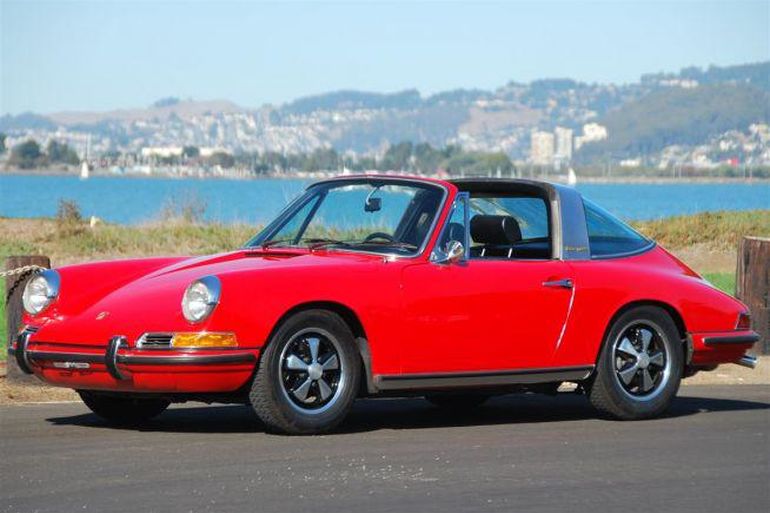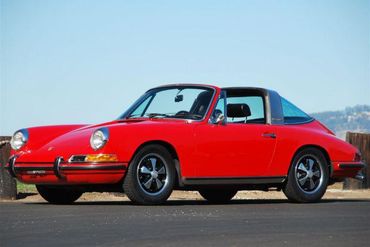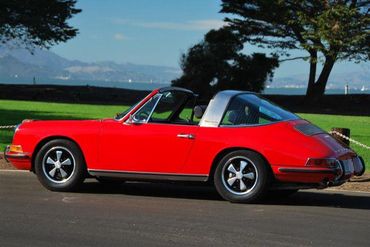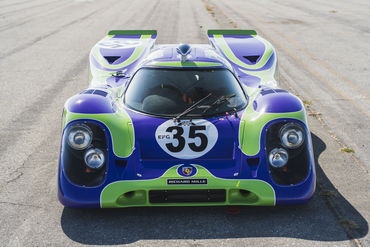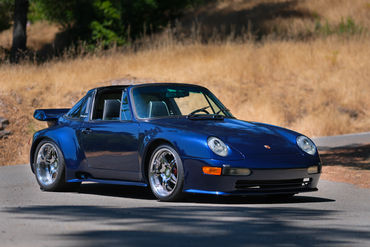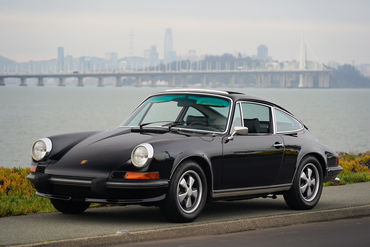Sold
SOLD 12/13
1968 Porsche
911S Targa
A Matching Numbers 911S Special Ordered by Interserie Champion and Factory Driver Jürgen Neuhaus. Many Unique Options and Features.
- VIN11850164
- Exterior ColorRed
- Interior ColorBlack
- Mileage24544 Miles
- Engine2.0 Litre Flat 6-Cylinder
- Engine no.4080563
- Transmission5-Speed
- StatusSold
- StockFJ1493
Description
1968 Porsche 911S Targa
s/n 11850164, engine no. 4080563
Red with Black Interior
Early 911’s embody a combination that is rare among collector cars today. They have unparalleled drivability and usability, especially when compared with other cars of the same vintage, but are also wholly evocative of a different era. There is a certain wholeness, cohesiveness, agility, and communicativeness that is only evident when they are driven, and it is no surprise that they have a fanatical following. For many years, however, they were just used cars, which makes finding genuinely solid examples which have been continuously cared throughout the car’s life very difficult today.
All early 911’s have appreciated tremendously in recent years, and short wheelbase cars (1968 and earlier) have seen particularly strong interest during this period. The 911S, introduced for 1967, has led the appreciation curve because of its performance and exclusivity. The car became the top of the line model and has a higher level of specification in several ways, as well as a dramatically different character from the standard 911. This change was due in large part to the engine, which boasted an increased compression ratio, more aggressive camshafts, and higher flow carburetors, which boosted the power from 130hp to 160hp. The suspension was upgraded as well, and the 911 was fitted for the first time with Fuchs forged alloy wheels, which were lighter, stronger, and would become a design icon intimately associated with the 911 for over 20 years. The level of interior trim and equipment was higher in the 911S, and it was available for an additional $1000 in the US market, bring its base price to just a shade under $7000 in coupe form.
The Targa, Porsche’s unique safety convertible with integrated roll bar, was available for on any model (912, 911 or 911S) for an additional $400, which made the 911S Targa the most expensive standard production street Porsche available at the time, and the 1968 911S Targa had the lowest production volume of any 1967-73 911 variant with 442 units built. Initially available with zip out soft rear window only, an optional heated glass rear window became officially available in February of 1968, and eventually became standard by the 1970 model year.
This particular car was built in December of 1967 yet is equipped with glass rear window, three months before the option was officially available. This is the first hint that this car was ordered by someone special, someone who had some extra “pull” at Porsche. The factory Kardex indicates several other unusual options, including 100 liter endurance fuel tank, travel ski bag, and two Barverkauf suitcases. The car was also ordered with Webasto heater, tinted glass, loudspeaker, antenna, headrests, and Dunlop tires, and was originally finished in Tangerine with corduroy interior. Reportedly, the car is also experimentally equipped with 5 inch front wheels and 5.5 inch rear wheels in an effort to neutralize the handling of the car, which diverges from the typical equipment of both the 1967 (4.5 inches all round) and 1968 (5.5 inches all round) 911S
The Kardex indicates that the car was originally ordered by Jürgen Neuhaus, a factory Porsche racing driver who had a distinguished career driving the Carrera 6 (he won seven of eight outings in the car in 1967), the 911S (14 victories in 1967), basically any variant of the 911, and the 917. In fact, in 1970, Neuhaus became the first champion of the Interserie Championship (the European equivalent to Can-Am), driving the 917. Neuhaus went on to race for Kremer during the 70s, a period during which the cars were often faster than the factory Werks cars, much to the irritation of Porsche.
In a 2012 interview about this car, Neuhaus remembered it vividly, recounting that he ordered it with the 100 liter fuel tank because that was the specification of the cars he raced and he liked having the additional range. The suitcases and ski bags were to facilitate his frequent ski trips in Switzerland, which also motivated the inclusion of the heated glass rear window. Incidentally, at the time of the interview, Neuhaus was still instructing at Hockenheim and the Nurburgring. In the early 70s, Neuhaus sold the car to a young man, then 18 years old, who bought it because he could not afford a Ferrari 275. That fellow, Klaus Werner, subsequently went on to become a collector and eventually bought the 275 he was seeking. He was also interviewed about this car in 2012, recounting that he kept the car until the local Porsche dealer inquired about purchasing it for Porsche of Beverly Hills on behalf of an American plastic surgeon who collected Porsches and Lamborghinis. The car remained in Beverly Hills until the 1990s, before being passed on to a collector in Texas. The car was restored during this period and the car’s color changed to its current red.
This matching numbers car is extraordinarily complete with factory tool roll, tools, Certificate of Authenticity, a copy of the factory Kardex, original brochures (a large one, a smaller folding one, and a color), a shadowbox display containing a Jürgen Neuhaus watch, hat, and two shirts. The tool roll is extremely complete aside from the spark plug wrench, including polishing cloth and Messko tire pressure gauge.
The car has seen considerable recent service work in the last 1000 miles, including a new clutch, and an extensive service completed by Hi Tec Auto in San Rafael, California completed in November of 2013. The service totaled approximately $11,000 and included rebuilt carburetors, new suspension bushings (to the sway bars, spring plates, and front control arms), several new fuel hoses, new motor mounts, valve adjustment and full service with oil change, brake fluid flush, rebuilt front brake calipers, new front brake pads, and miscellaneous electrical fixes.
The car presents very nicely. The paintwork was done to high standards and makes a strong overall impression, being lustrous and well-executed. There are a few stone chips to the front of the car, as well as a crack in the bottom of the passenger’s door. The body is excellent with good gaps and panel fit. The top is in excellent shape as well. The wheels have been refinished and are fresh in appearance. The grille and trim are excellent and the chrome is very nice overall, with some pitting in evidence.
The interior is extremely nice with excellent dashboard, correct plush carpets, and correct for the S basketweave dashboard. The car also has its correct S instruments. The seats, carpets, switches, and controls are in excellent shape. The car is equipped with period correct Blaupunkt radio.
The engine compartment is extremely clean and is nicely detailed. In terms of condition, it is not far off of show condition. The sheetmetal has been correctly refinished and the car has its correct red fan shroud. The engine has been retrofitted with Carrera hydraulic chain tensioners. The trunk is structurally excellent and in good cosmetic condition. The carpets is excellent and the overall presentation is correct and tidy. The smuggler’s box is unrestored but extremely solid.
This is a truly unrepeatable opportunity to acquire a historically significant 911S Targa with fantastic provenance and unique equipment. This matching numbers car was originally ordered by a championship-winning factory Porsche race driver with a host of unique racing options and is reported to be the very first glass window Targa ever built. Today it survives in excellent condition with its original engine and transmission, tools, a host of fascinating documents and artifacts that support the provenance of the car. Included among these is a narrative written in 2012 that recounts the interviews conducted in Germany with the car’s first and second owners, Jürgen Neuhaus and Klaus Werner.
The above vehicle information is complete and accurate to the best of our knowledge at the time it is posted to this website. Corrections or additional information is always appreciated. All advertised prices exclude government fees and taxes, any finance charges, any dealer document preparation charge, and any emission testing charge. Vehicles are subject to prior sale. All advertised to be true but not guaranteed. We assume no liability for errors or omissions.
Inquire About This Car
Fantasy Junction • 510-653-7555 • 1145 Park Ave, Emeryville, CA 94608
